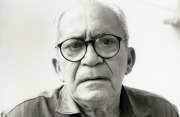|
Biography Joăo Cabral de Melo Neto
Joăo Cabral de Melo Neto (9 de janeiro de 1920, Recife – 9 de outubro de 1999, Rio de Janeiro) foi um poeta e diplomata brasileiro. Sua obra poética, caracterizada pelo rigor estético, com poemas avessos a confessionalismos e marcados pelo uso de rimas toantes, inaugurou uma nova forma de fazer poesia no Brasil.
Irmăo do historiador Evaldo Cabral de Melo e primo do poeta Manuel Bandeira e do sociólogo Gilberto Freyre, Joăo Cabral foi amigo do pintor Juan Miró e do poeta Joan Brossa. Membro da Academia Pernambucana de Letras e da Academia Brasileira de Letras, foi agraciado com vários prêmios literários. Quando morreu, em 1999, especulava-se que era um forte candidato ao Prêmio Nobel de Literatura.
Sobre sua obra
Quando o leitor é confrontado com a poesia de Cabral percebe-se, a princípio, de um certo número de algumas dualidades antitéticas, por vezes obsessivas. Entre espaço e tempo, entre o dentro e o fora, entre o maciço e o năo-maciço... Entre o masculino e o feminino, entre o Noroeste desértico e a Andaluzia fértil, ou entre a Caatinga desértica e o úmido Pernambuco. É uma poesia que causa algum estranhamento porque năo é emotiva, mas sim cerebral. Melo Neto năo recorre ao pathos ("paixăo") para criar uma atmosfera poética, mas a uma construçăo elaborada e pensada da linguagem e do dizer da sua poesia.
Algumas palavras săo usadas sistematicamente na poesia deste autor: cana, pedra, osso, esqueleto, dente, gume, navalha, faca, foice, lâmina, cortar, esfolado, baía, relógio, seco, mineral, deserto, asséptico, vazio, fome.
Curiosidades
* Estranhamente, Joăo Cabral escreveu um poema sobre a Aspirina, que tomava regularmente, chamando-a de "Sol", de "Luz"… De fato, desde sua juventude Joăo Cabral tomava de três a dez aspirinas por dia. Em entrevista à "TV Cultura", certa vez, ele contava que boa parte da inspiraçăo (inspiraçăo sempre cerebral) provinha da aspirina, que a aspirina o salvava da nulidade!
* Joăo Cabral de Melo Neto năo compareceu a nenhuma reuniăo da Academia Pernambucana de Letras como acadêmico, nem mesmo a sua posse
***
João Cabral de Melo Neto (1920-1999) was born in the state of Pernambuco, Brazil, and is considered one of the greatest Brazilian poets of all time.
He is often quoted saying "I try not to perfume the flower". His works are said to be dry, devoid of exaggerated emotions that is usually associated with poetry, sticking usually to images and actions and physical descriptions rather than feelings. The image of an engineer designing a building is often used to describe his poetry. It usually follows a strict meter and assonant rhymes.
He worked as a diplomat for most of his life.
In 1990, he won the Camões Prize, the greatest prize in literature of the Portuguese language. In 1992, João Cabral received the Neustadt International Prize for Literature, which some consider to be almost as prestigious as the Nobel Prize.
Melo Neto's most famous poems are:
"Morte e Vida Severina" (translated in part by Elizabeth Bishop as "Death and Life of a Severino"), his most famous work, is a very long narrative poem (in most editions it goes over 80 pages) that describes the life of a poor country man in the dry northeastern part of Brazil.
"Uma Faca só Lâmina" (A Knife All Blade) is also considered to be one of his best works, and was translated to English in 1980. The poem is about the many ways to describe "that sorrowful absence in a man".
"Cão sem Plumas" (A Dog Without Feathers) describes the Capibaribe river of Pernambuco, and the poverty-stricken community that surrounds it.
Poetry
Pedra do Sono [Rock of the Sleep] (1942)
Os Três Mal-Amados [The Three Not-loved] (1943)
O Engenheiro [The Engineer] (1945)
Psicologia da Composição com a Fábula de Anfion e Antiode (1947)
O Cão Sem Plumas [The Dog Without Feathers](1950)
O Rio ou Relação da Viagem que Faz o Capibaribe de Sua Nascente à Cidade do Recife [The River or Relation of the trip that Capibaribe does from its source until the Town of Recife](1954)
Dois Parlamentos [Two Parliaments](1960)
Quaderna (1960)
A Educação pela Pedra [The Education through the Rock] (1966)
Museu de Tudo [Museum of Everything] (1975)
A Escola das Facas [The School of the Knives] (1980)
Auto do Frade (1984)
Agrestes (1985)
Crime na Calle Relator (1987)
Primeiros Poemas [First Poems] (1990)
Sevilha Andando [Walking Sevilla] (1990)
|





